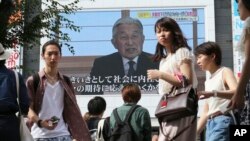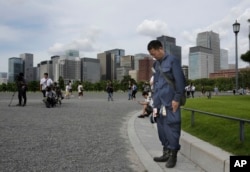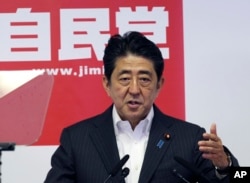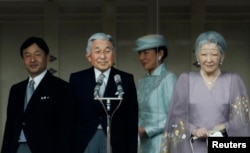Japanese Emperor Akihito made a rare televised address to the nation Monday to argue that he is becoming too old and too frail to carry out his duties.
“When I consider that my fitness level is gradually declining, I am worried that it may become difficult for me to carry out my duties as the symbol of the state with my whole being, as I have done until now," Akihito said in his address.
The 82-year-old emperor is reportedly in declining health. In recent years he has had heart surgery, bronchitis and has been treated for prostate cancer.
The emperor cannot simply abdicate his throne because the 1947 Imperial House Law states that imperial succession can occur only upon an emperor’s death.
The emperor stopped short of advocating that parliament change the law because he did not want to be seen as interfering in national politics.
“He was asking for the understanding of the Japanese people in his situation. His message did not have any political impact nor diplomatic impact,” said Japan analyst Hosaka Yuji with Sejong University in Seoul.
Japanese opinion polls show 80 to 90 percent public support changing the law so that the emperor can abdicate.
But some traditionalists in Prime Minister Shinzo Abe's conservative ruling coalition are reluctant to open the abdication issue up for debate, because the process could introduce other changes they strongly oppose, like allowing women to inherit the throne.
Prime Minister Abe was non-committal in his response to the emperor’s subtle plea to change the imperial succession law.
"Considering the emperor's age and burden on his duties, I think about his mental fatigue. I think we should carefully think what is possible according to his message," Abe said.
Symbol of unity
Born in 1933, Akihito ascended to the throne in 1989 after the death of his father, Hirohito, who was considered a deity until Japan's defeat in World War II.
The occupying American forces stripped the emperor of his powers, and defined his role in the new post war constitution as “a symbol of the state and of the unity of the people.”
Akihito is a popular figure and is seen as a more approachable and engaging emperor than his father. He even broke with tradition to marry a commoner, the Empress Michiko.
In countries like China and the Philippines Akihito has tried to heal the wounds of World War II by expressing remorse for the death and destruction caused by Japan.
While the emperor does not overtly take sides in Japanese politics, Akihito has made recent statements that seemed critical of conservative Prime Minister Shinzo Abe’s ruling coalition.
Abe and his nationalist supporters have tried to downplay the military’s alleged past war crimes and maintain that Japan should not have to apologize in perpetuity for World War II.
To mark the 70th anniversary of end of the war last year, the emperor delivered a much more conciliatory message than Abe when he said, “Looking back at the past, together with deep remorse over the war, I pray that this tragedy of war will not be repeated, and together with the people express my deep condolences.”
The emperor has also been a strong proponent of preserving the pacifist constitution that Abe wants to revise to expand the powers of the military.
Crown Prince Naruhito
Akihito’s son and heir, 56-year-old Crown Prince Naruhito, has already taken over some of his father’s official duties.
The crown prince is expected to support his father’s positions in support of the pacifist constitution and in maintaining a conciliatory approach in dealing with concerns from Japan’s neighbors.
“When his ideology on peace is needed for some cases, there is a possibility that he can play a role as a young power broker which could influence the current situation,” said Hosaka.
Last year, during a discussion about Japan’s participation in forcing as many as 200,000 women into sexual slavery during the war, Naruhito seemed to rebuke nationalists who tried to deny or minimize these claims.
“It is important to look back [at] our past with modesty and pass down correctly the miserable experience and the historic path Japan took,” he said.
Youmi Kim in Seoul contributed to this report.











